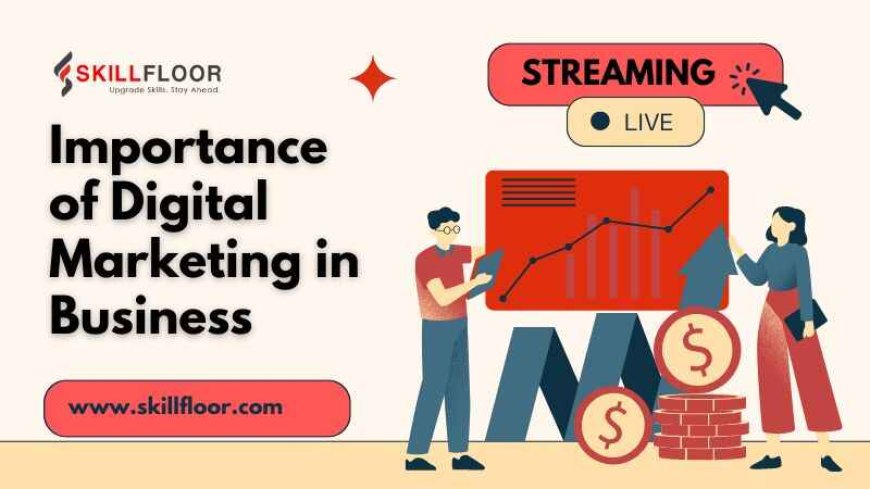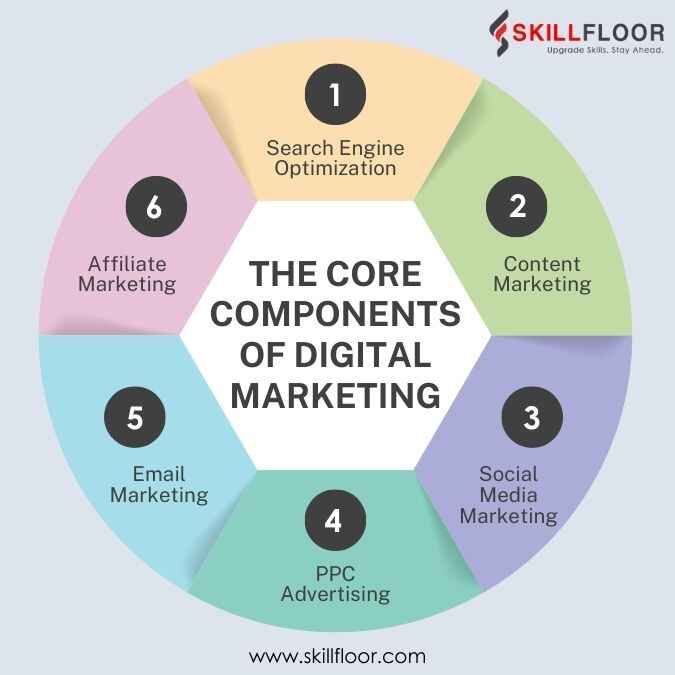Importance of Digital Marketing in Business
Discover how digital marketing drives business growth, boosts online presence, and enhances customer engagement. Learn its vital role in modern business success.

The importance of digital marketing in business is clear in today's fast-paced marketplace. It serves as an important tool for reaching a large audience, enabling businesses to communicate with potential customers via a variety of Internet venues. Social media campaigns, email marketing, and search engine optimization (SEO) are examples of digital marketing tactics that enable businesses to target specific audiences and adapt their messaging more successfully. This targeting improves communication and increases conversion rates, both of which are critical for long-term success. Furthermore, digital marketing produces measurable results, allowing businesses to monitor their performance and make informed decisions to improve their marketing efforts.
Moreover, the importance of digital marketing in business extends to the ability to compete in a global market. Small and medium-sized organizations (SMEs) can employ digital marketing to differentiate themselves from larger companies. These firms may increase their visibility and brand recognition by implementing low-cost web marketing tools and tactics. Content marketing, pay-per-click (PPC) advertising, and influencer collaborations are some of the techniques that help businesses increase their online presence and interact with customers. Because of the dynamic nature of digital marketing, firms must keep up with trends and constantly change their strategies to be relevant and effective in the digital realm.
The Core Components of Digital Marketing
-
Search Engine Optimization (SEO): Optimizing your website to appear higher in search engine results pages (SERPs) can increase organic (non-paid) traffic to your site. This includes keyword research, on-page optimization, and backlink creation. Effective SEO increases visibility and draws more visitors. It's crucial for long-term online success.
-
Content Marketing: Creating and disseminating valuable, relevant, and consistent material to attract and maintain a certain audience. This may include blog articles, videos, infographics, and eBooks. Quality content captivates and informs your readers. It promotes brand authority and trust.
-
Social Media Marketing: Using social media tools to market your brand and engage your target audience. This applies to both organic posts and sponsored adverts. Social media marketing increases brand exposure and customer engagement. It's a dynamic approach to reach and connect with your target audience.
-
Pay-Per-Click (PPC) Advertising: A strategy of increasing traffic to your website by paying a publisher each time your ad is clicked. Google Ads is one of the most widely used PPC platforms. PPC provides immediate visibility and tailored reach. It's a great approach to get quick results and leads.
-
Email Marketing: Sending emails to prospects and customers to build relationships, promote content, and increase conversions. Personalization and segmentation are key components of successful email marketing strategies. Email marketing encourages direct engagement with your audience. It is an effective instrument for customer retention and engagement.
-
Affiliate Marketing: Making a commission by marketing other people's (or companies') products. This might be an affordable strategy to increase sales and traffic. Affiliates increase your reach and trustworthiness. It is a performance-based marketing strategy with a large impact.

Benefits of Digital Marketing
1. Cost-Effectiveness
Compared to traditional marketing methods, digital marketing is often more affordable. With a well-planned strategy, businesses can reach a large audience at a fraction of the cost of TV or print advertising. Tools like social media platforms and email marketing services often offer free or low-cost options.
2. Measurable Results
One of the biggest advantages of digital marketing is the ability to measure and track results. Analytics tools can provide detailed insights into campaign performance, allowing businesses to make data-driven decisions and optimize their strategies.
3. Targeted Marketing
Digital marketing allows for precisely targeting specific demographics, interests, and behaviors. This ensures that marketing efforts are focused on the most relevant audiences, increasing the likelihood of conversions.
4. Improved Customer Engagement
Businesses can engage with their customers in real time through social media, email, and other online channels. This fosters stronger relationships, builds brand loyalty, and encourages repeat business.
5. Enhanced Reach
The Internet provides a global platform for businesses to reach a wider audience. Even small companies can access international markets through digital marketing, expanding their customer base and opportunities for growth.
How to Leverage Digital Marketing for Business Success
1. Develop a Clear Strategy
Start with a well-defined digital marketing strategy that is in line with your business objectives. Identify your target audience, establish quantifiable goals, and select the appropriate digital channels to reach them. A defined strategy ensures your efforts are focused and yield greater outcomes. It establishes the groundwork for all of your digital marketing initiatives.
2. Optimize Your Website
Make sure your site is optimized for both search engines and users. This includes a mobile-friendly design, quick load times, and easy navigation. High-quality, relevant content is critical to SEO. An optimized website improves both the user experience and search rankings.
3. Utilize Social Media
Choose the most popular social media sites for your target demographic and actively participate with them. To increase your reach, post regularly, respond to comments, and employ paid ads. Social media increases brand recognition and encourages community interaction. It's an effective tool for communicating and interacting with customers.
4. Invest in Content Marketing
Create valuable material that meets your audience's requirements and interests. This will help your brand gain authority in your sector and increase organic traffic to your website. Quality content fosters trust and engages readers. It is critical for acquiring and retaining customers.
5. Monitor and Adjust
Use analytics tools to regularly monitor the effectiveness of your digital marketing initiatives. Prepare to alter your strategy based on what works and what does not. Continuous optimization guarantees that your campaigns stay effective. It enables you to remain sensitive to market trends and audience preferences.
Digital marketing is a vital tool that can greatly enhance a business's reach, engagement, and profitability. By effectively utilizing components like SEO, content marketing, social media, PPC, email, and affiliate marketing, businesses can create targeted, cost-effective, and measurable campaigns. These strategies drive significant results and foster growth. As the digital market evolves, keeping up with the latest trends and best practices is essential for ongoing success. Embracing digital marketing not only improves visibility and customer interaction but also ensures businesses remain competitive and relevant in an increasingly digital world.




























































